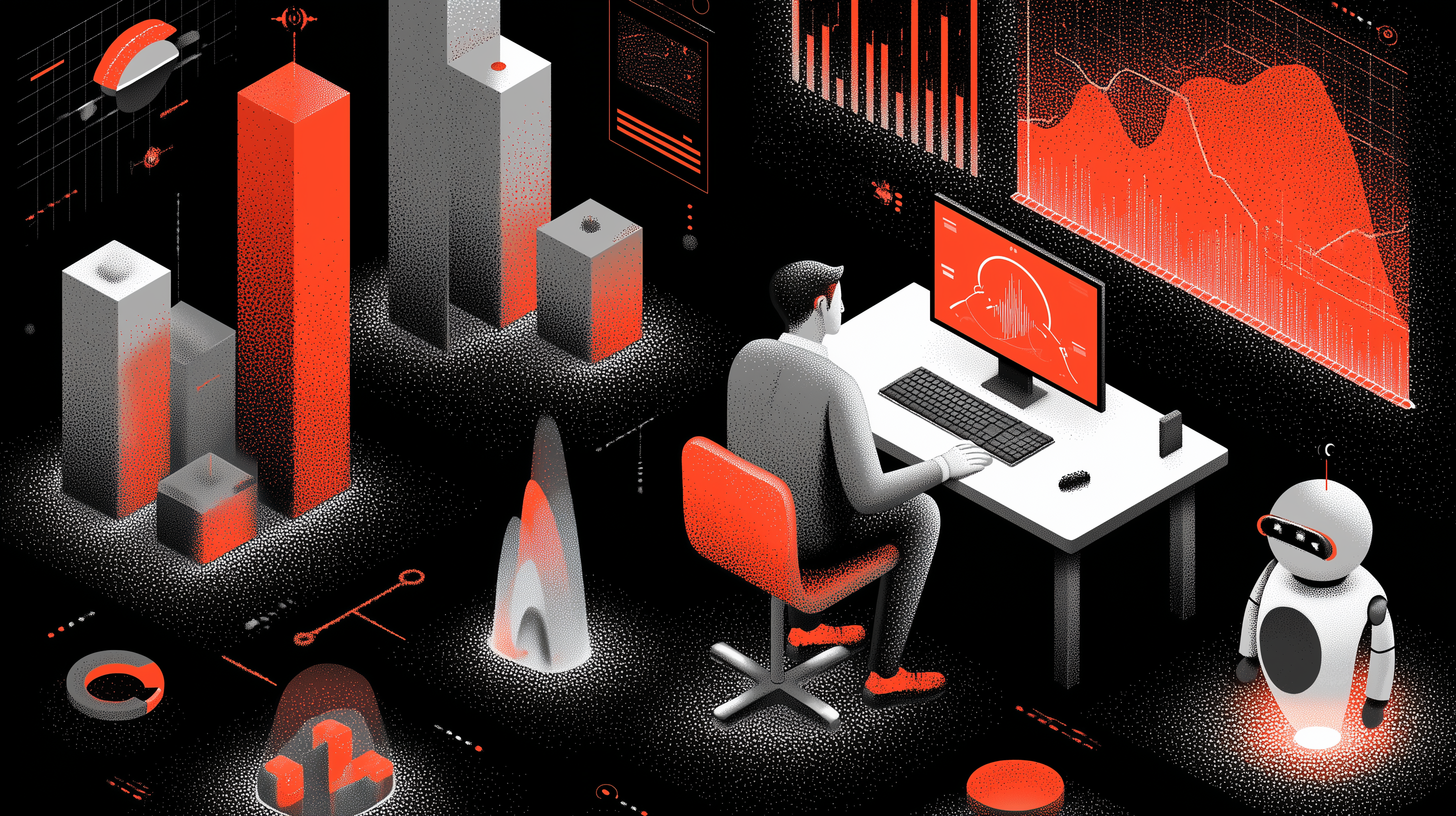Intelligent automation: how AI agentics helps to make better marketing decisions

Agentic AI Transforms Marketing Decision-Making: Analyzing, Recommending, and Guiding Teams Toward Smarter Choices
Intelligent Automation: How Agentic AI Helps Marketers Make Better Decisions
Automation Enters the Age of Decision
Modern marketing relies on countless daily micro-decisions—budget allocation, message selection, and channel prioritization. In a data-saturated environment, the challenge is no longer collecting information but turning it into effective decisions.
After the rise of generative AI focused on content creation, a new approach is emerging: agentic AI. It stands out for its ability to analyze, reason, and suggest actions based on specific objectives. Businesses see it as a way to make their marketing decisions faster and more reliable.
According to WARC (2024), agentic AI enables marketing teams to move from a reactive to a continuously optimized approach, reducing unnecessary blocks and performance losses in digital campaigns.
(WARC – Agentic AI breaks the cycle of overblocking and underperformance: https://www.warc.com/newsandopinion/opinion/agentic-ai-breaks-the-cycle-of-overblocking-and-underperformance/en-gb/7102)
What Is Agentic AI? A Natural Evolution of Generative AI Applied to Marketing
Agentic AI refers to systems capable of understanding context, reasoning, and proposing operational decisions. It goes beyond producing content or responses by acting on defined marketing objectives, using multiple data sources such as audience behavior, ad results, and product performance. This evolution reflects intelligent automation: agents don’t replace teams but enhance the speed, consistency, and quality of their decisions.
How Agentic AI Improves Marketing Decision-Making
From Data to Decision: Strengthening the Link
One of agentic AI’s key strengths lies in its ability to turn raw data into actionable insights. It aggregates signals from CRM systems, media campaigns, e-commerce, and social analytics, translating them into clear recommendations.
According to an IBM Institute for Business Value study, 69% of executives believe agentic AI improves decision-making in their organizations.
(IBM Newsroom: https://newsroom.ibm.com/2025-06-10-IBM-Study-Businesses-View-AI-Agents-as-Essential%2C-Not-Just-Experimental)
These systems act as filters: they don’t decide for marketers but allow them to base their judgments on consolidated and contextualized data.
Toward More Consistent and Measurable Decisions
Marketing decisions are often influenced by experience, intuition, or time pressure. Agentic AI introduces a more systematic approach—it compares possible scenarios and estimates the likely impact of each choice.
By providing an objective analytical foundation for decisions often made under constraints, it helps teams balance intuition with data, strengthening strategic coherence.
Greater Reactivity and Real-Time Decisions
AI agents continuously monitor performance and respond to market changes. When a campaign underperforms, they can suggest reallocating budgets or adjusting targeting before losses grow.
This adaptability becomes a key performance driver: according to PwC, 79% of organizations have already adopted AI agents, and 66% report measurable value—particularly in improving responsiveness and accuracy in marketing actions.
(PwC: https://www.pwc.com/us/en/tech-effect/ai-analytics/ai-agent-survey.html)
This agility transforms marketers’ roles, allowing them to adjust strategies continuously rather than waiting for end-of-cycle reporting.
New Applications in Operational Marketing
Agentic AI is finding applications in areas where rapid decision-making and reliable data are crucial:
- Digital advertising: AI agents evaluate campaign performance and automatically reallocate budgets to the most effective channels.
- Content and CRM: Automated identification of the most effective messages by segment.
- Project management: Resource optimization and delay anticipation.
In the latter case, collaborative platforms such as MTM play a complementary role. They help marketing and creative teams structure workflows, centralize deliverables, and streamline content validation—creating a clear workspace where AI-driven recommendations can be integrated, reviewed, or discussed.
Implementation: Integrating Agentic AI Into Marketing Workflows
Adopting agentic AI follows a progressive path:
- Map out key decision points—targeting, budgeting, and campaign prioritization.
- Connect data sources to feed the agents.
- Define governance and validation rules.
- Measure the impact of recommendations on real performance.
Value emerges at the intersection of automated analysis and structured decision-making. Leading organizations already treat agentic AI as a decision-support system, comparable to a digital analyst embedded in marketing workflows.
Limits and Perspectives
Like any automation technology, agentic AI requires reliable data and well-trained models. Its recommendations may be biased if the input data is flawed. Marketing leaders must therefore ensure data quality and decision traceability.
In the medium term, analysts anticipate the rise of hybrid systems combining:
- algorithmic reasoning,
- human expertise,
- and strategic consistency control.
Conclusion: AI in Service of Smarter, More Rigorous Marketing Decisions
Agentic AI represents a pragmatic evolution of automation. Its purpose is not to replace marketers but to enhance the rigor, speed, and accuracy of their decisions in increasingly complex environments. By providing an analytical framework for strategic choices, it turns data into a competitive advantage.
Marketing is thus entering a new era—one of decisions illuminated by artificial intelligence, grounded in facts rather than intuition.
FAQ: Understanding Agentic AI’s Impact on Marketing Decision-Making
What is agentic AI in marketing?
AI that analyzes data, anticipates actions, and recommends contextually relevant decisions.
How does it differ from generative AI?
Generative AI creates content; agentic AI guides marketing decisions based on data.
What are the benefits for marketing teams?
Faster, more consistent, and measurable decisions with better budget allocation.
How can it be integrated into existing workflows?
By connecting CRM, media, and project management tools to AI agents via API.
What are the risks?
Dependence on poor-quality data or lack of transparency in recommendation criteria.
Sources
- WARC – Agentic AI breaks the cycle of overblocking and underperformance: https://www.warc.com/newsandopinion/opinion/agentic-ai-breaks-the-cycle-of-overblocking-and-underperformance/en-gb/7102
- IBM – AI Agents in Marketing: https://www.ibm.com/fr-fr/think/topics/ai-agents-in-marketing
- Ringover – Agent IA Marketing: https://www.ringover.fr/blog/agent-ia-marketing
- PHD & WARC Global Study 2024: https://www.prnewswire.com/news-releases/new-global-research-from-phd-and-warc-reveals-ai-knowledge-gaps-conflicting-expectations-among-marketing-stakeholders-302231708.html
- Exchange4Media – Marketing is quietly being rewritten by Agentic AI: https://www.exchange4media.com/marketing-news/marketing-is-quietly-being-rewritten-by-agentic-ai-147421.html
Other Posts

The death of nuance: When the 'prompt' replaces the brief, is creative essence lost?

The best AI for marketing in 2026 : the best solutions to stimulate creativity and strategy

